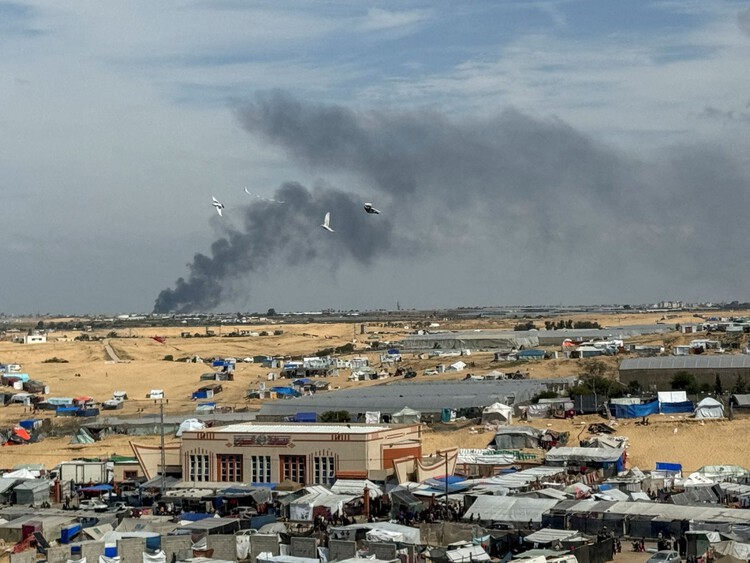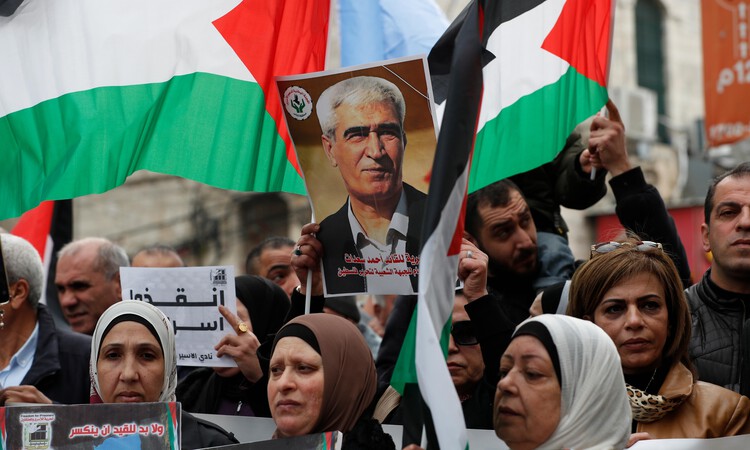Figured if anyone was going to know secrets between governments or terrorist groups or governments & terrorist groups, or what Grandma is saying about her neighbours…the NSA would know.Technical point. . . it was the National Security Council, not NSA. NSA is the intelligence agency.
Hamas attacks Israel
- Thread starter Serryah
- Start date
You are using an out of date browser. It may not display this or other websites correctly.
You should upgrade or use an alternative browser.
You should upgrade or use an alternative browser.
Yeah. . . but it wouldn't say.Figured if anyone was going to know secrets between governments or terrorist groups or governments & terrorist groups, or what Grandma is saying about her neighbours…the NSA would know.
I used to work there.
Making pizza in cafeteria?Yeah. . . but it wouldn't say.
I used to work there.
Egypt and Qatar have been trying to narrow differences between Israel and Hamas over what a ceasefire should look like as a deepening humanitarian crisis has one quarter of the population in the battered Gaza Strip facing famine.
Hamas said ceasefire negotiations had faltered over the past few weeks due to Netanyahu’s rejection of its demands, which include a permanent ceasefire (until the next time?), Israeli withdrawal from the strip (like before Oct 7th), the return of the displaced in the south of the enclave to the centre and the north, and stepping up aid without restrictions.
Israeli Prime Minister Benjamin Netanyahu's office said on Thursday a new Gaza truce proposal presented by Hamas to mediators was still based on "unrealistic demands."
Hamas has presented a Gaza ceasefire proposal to mediators and the U.S. which includes the release of Israeli hostages in exchange for freedom for Palestinian prisoners, 100 of whom are serving life sentences, according to a proposal seen by Reuters.
Hamas said the initial release of Israelis would include women, children, elderly, and ill hostages in exchange for the release of 700-1000 Palestinian prisoners, according to the proposal. The release of Israeli "female recruits" is included.
According to the latest proposal, Hamas said a date for a permanent ceasefire would be agreed upon after the initial exchange of hostages and prisoners as well as a deadline for an Israeli withdrawal from Gaza.
The group said all detainees from both sides would be released in a second stage of the plan. Late on Thursday, Hamas said it presented to mediators a comprehensive vision of a truce based on stopping what it calls Israeli aggression against Palestinians in the Gaza Strip, providing relief and aid, the return of displaced Gazans to their homes, and the withdrawal of Israeli forces.
The war was triggered by a Hamas-led attack on southern Israeli towns on Oct. 7 that left 1,200 people dead and 253 taken hostage, according to Israeli tallies. Israel rejected that draft proposal, citing its long-held goal of not ending the war until it destroyed Hamas. Hamas insists an agreement should end the war (Until the next Oct 7th, or the next, or the next…).

 apple.news
apple.news
What happened with the last cease fire?
Hamas said ceasefire negotiations had faltered over the past few weeks due to Netanyahu’s rejection of its demands, which include a permanent ceasefire (until the next time?), Israeli withdrawal from the strip (like before Oct 7th), the return of the displaced in the south of the enclave to the centre and the north, and stepping up aid without restrictions.
Israeli Prime Minister Benjamin Netanyahu's office said on Thursday a new Gaza truce proposal presented by Hamas to mediators was still based on "unrealistic demands."
Hamas has presented a Gaza ceasefire proposal to mediators and the U.S. which includes the release of Israeli hostages in exchange for freedom for Palestinian prisoners, 100 of whom are serving life sentences, according to a proposal seen by Reuters.
Hamas said the initial release of Israelis would include women, children, elderly, and ill hostages in exchange for the release of 700-1000 Palestinian prisoners, according to the proposal. The release of Israeli "female recruits" is included.
According to the latest proposal, Hamas said a date for a permanent ceasefire would be agreed upon after the initial exchange of hostages and prisoners as well as a deadline for an Israeli withdrawal from Gaza.
The group said all detainees from both sides would be released in a second stage of the plan. Late on Thursday, Hamas said it presented to mediators a comprehensive vision of a truce based on stopping what it calls Israeli aggression against Palestinians in the Gaza Strip, providing relief and aid, the return of displaced Gazans to their homes, and the withdrawal of Israeli forces.
The war was triggered by a Hamas-led attack on southern Israeli towns on Oct. 7 that left 1,200 people dead and 253 taken hostage, according to Israeli tallies. Israel rejected that draft proposal, citing its long-held goal of not ending the war until it destroyed Hamas. Hamas insists an agreement should end the war (Until the next Oct 7th, or the next, or the next…).
Hamas presents ceasefire proposal detailing exchange of hostages, prisoners — Reuters
Hamas has presented a Gaza ceasefire proposal to mediators and the U.S. that includes the release of Israeli hostages in exchange for freedom for Palestinian prisoners, 100 of whom are serving life sentences, according to a proposal seen by Reuters.
What happened with the last cease fire?
Arabs finally helping Arabs? Wow, what's next women allowed to get some sunshine?

Hamas doesn’t value the lives of Gazan civilians.
____________We are the IDF. Our purpose is to preserve the State of Israel, to protect its independence, and to stop its enemies from disrupting everyday lif...
And there’s the rub. Iran isn’t a lightweight in the Muddled East… with the largest army in the region by far, and some very different motivations:
 forums.canadiancontent.net
forums.canadiancontent.net

 en.wikipedia.org
en.wikipedia.org
Iranically Iran, Middle East’s Karen…
Iran has been in the news a lot lately, trying to “not” have violence spread into a larger Middle Eastern conflict, while spreading violence in the region into a larger Middle Eastern conflict…or at least it sure seems like it from the outside looking in. Iran and Saudi Arabia are engaged in an...

Islamic Republic of Iran Armed Forces - Wikipedia
Expect all the lunatic militamts to be eradicated by Saudi Arabia and Israel. Its going to be a long war.And there’s the rub. Iran isn’t a lightweight in the Muddled East… with the largest army in the region by far, and some very different motivations:
Iranically Iran, Middle East’s Karen…
Iran has been in the news a lot lately, trying to “not” have violence spread into a larger Middle Eastern conflict, while spreading violence in the region into a larger Middle Eastern conflict…or at least it sure seems like it from the outside looking in. Iran and Saudi Arabia are engaged in an...forums.canadiancontent.net

Islamic Republic of Iran Armed Forces - Wikipedia
en.wikipedia.org
But Israel is like the fat chick on the back of your bike….fun to ride but you might not wanna be seen doing so? Does Saudi Arabia wanna be seen affiliated with Israel when push comes to shove against their fellow Muslim neighbours??? Might loose some Allah Akbar Street Cred.Expect all the lunatic militamts to be eradicated by Saudi Arabia and Israel. Its going to be a long war.
Shia and Sunni they have been at each other’s throat since big Mo died .But Israel is like the fat chick on the back of your bike….fun to ride but you might not wanna be seen doing so? Does Saudi Arabia wanna be seen affiliated with Israel when push comes to shove against their fellow Muslim neighbours??? Might loose some Allah Akbar Street Cred.
But they both hate outsiders so they have that going for them…until there’s no more outsiders to rally against… then they will cannibalize themselves I guess.Shia and Sunni they have been at each other’s throat since big Mo died .
And I say, "Hey, Lama, hey, how about a little something, you know, for the effort, you know." And he says, "Oh, uh, there won't be any money, but when you die, on your deathbed, you will receive total consciousness." So I got that goin' for me, which is nice.
Yes. Yes they do. They have the best bicycle oil money can buy the distracts the focus from the fat chick.But Israel is like the fat chick on the back of your bike….fun to ride but you might not wanna be seen doing so? Does Saudi Arabia wanna be seen affiliated with Israel when push comes to shove against their fellow Muslim neighbours??? Might loose some Allah Akbar Street Cred.
Saudis want nukes to dominate the ME. To do so they have no choice but make a pact with Israel.

What’s happening with normalising ties between Saudi Arabia and Israel?
Saudi Arabia ready to normalise relations with Israel in exchange for a US defence pact and civilian nuclear programme.
Saudi Arabia and Israel quietly prepare ‘deal of the century’
IBA Global Insight October/November 2017. Global Insight investigates a major yet secretive new alliance between Saudi Arabia and Israel intended to bring peace to a tumultuous region and make Saudi Arabia the uncontested leader of the Middle East.
Israeli negotiators are expected to arrive in Qatar on Sunday amid intense new efforts to bring the war in Gaza to at least a temporary halt, after Hamas abandoned key ceasefire demands last week following a series of setbacks.
In recent days, the militant organisation has been disappointed by the failure of its calls for a wave of protest during the Muslim holy month of Ramadan, angered by the appointment without consultation of a new prime minister by the Palestinian Authority (PA) and suffered the possible death of a key military commander in an Israeli airstrike in Gaza…on the UNRWA aid centre that’s got no affiliation to Hamas.
Sources close to Hamas said its leaders now recognise that they need to show Palestinians “a big victory” to avoid a popular backlash after the immense destruction and loss of lives in five months of war.
“They know now that they need to demonstrate that they are really on the side of the people,” said one source.
Though the militant Islamist organisation is sticking to its demand for the release of between about 500 and 1,000 Palestinian prisoners from Israeli jails in return for 40 of more than 100 Israeli hostages that it is thought to be holding in Gaza…so a ratio of 12:1 to 25:1 because Israel is callous and uncaring about its citizens being held hostage? Sounds about right.
…& it (Hamas) has dropped a demand for a permanent ceasefire and has said it will accept a 40-day initial pause in hostilities, so a resupply of Hamas instead of a capitulation by Israel. More realistic.
Israeli officials now believe that Marwan Issa, the deputy military leader of Hamas in Gaza, died in an airstrike a week ago that targeted a tunnel complex under the Nuseirat refugee camp in central Gaza (oh, so not the UNRWA building this time. My mistake & confusion above) All Hamas communications systems between senior leaders – which rely on encrypted apps and couriers – went silent for more than 72 hours after the strike, as has happened on several previous occasions when senior Hamas leaders have been killed.
The strike against Issa, one of the key organisers of the 7 October attack launched by Hamas on Israel, suggests Israel is getting information from a source high in the organisation, experts said.
“Israel would have needed to know where and when Issa was hiding, that he would remain there with time for the cabinet to approve and [Israeli’s military] to launch the operation, and would have needed to confirm that no Israeli captives were being held near him as human shields – something that could have only been confirmed via a human asset,” said Avi Melamed, a former Israeli intelligence official and regional analyst.
Hamas killed about 1,160 Israelis, mostly civilians, on 7 October and took approximately 250 hostages, of whom about half were released during a week-long ceasefire in November in exchange for hundreds of Palestinian prisoners. Thirty or more might have died in captivity.
Hamas has also demanded a withdrawal of all Israeli troops from Gaza, more humanitarian aid to be allowed into the territory and the return of displaced residents to its north, which has been devastated by the Israeli offensive. Israel has called the proposal “unrealistic”, but observers noted this was more moderate language than previously.

 apple.news
After weeks of fruitless negotiations, news came in a quick flurry on Friday with a fresh set of demands from Hamas and an announcement that an Israeli delegation would travel to Qatar to rejoin indirect talks mediated by the Gulf state.
apple.news
After weeks of fruitless negotiations, news came in a quick flurry on Friday with a fresh set of demands from Hamas and an announcement that an Israeli delegation would travel to Qatar to rejoin indirect talks mediated by the Gulf state.
Hamas has dropped demands for Israel to free all Palestinians held in its prisons, who number more than 9,000, according to rights campaigners. However, the militant Islamist organisation is now asking for the release of between 400 and 1,000 “ordinary prisoners”, plus 57 who have been convicted of serious crimes including multiple murders, Palestinian officials told the Guardian.
The 57 most serious offenders whose freedom is demanded by Hamas include the masterminds of bombings in Israel at a hotel and shopping mall that killed 65 Israelis, seen as some of the worst terrorist attacks in the country, and the planner of the assassination of an Israeli minister. Another is serving 54 life sentences for organising suicide bombings that killed 46 Israelis.
Agreeing to a deal that leads to the release of such prisoners may fracture the coalition government of Benjamin Netanyahu, Israel’s prime minister. Polls show deep opposition among Israelis to such concessions, though Netanyahu is also under pressure to obtain the freedom of the surviving hostages.
In exchange for the 400-1000 mentioned above, Hamas is willing to release women, men under 19 and over 50 years old, and ill people – a total of 40 hostages, the Palestinian officials said…so still less than 1/2 of the potentially surviving hostages
Israeli officials say 134 hostages are still held in Gaza, though about 30 may be dead.
Norman (Dr Julie Norman, an associate professor of political science at University College London and the author of a book on Palestinian prisoners) described any prisoner release as “probably the bitterest pill for Israelis to swallow”.
“They (the Israeli’s) don’t want to reward what Hamas has done, and they don’t want to release people who could harm them in the future,” she said. “Part of the aims of the 7 October attack was to force a prisoner release and that is one of the most politically significant things that any such organisation can achieve.”

 apple.news
apple.news
In recent days, the militant organisation has been disappointed by the failure of its calls for a wave of protest during the Muslim holy month of Ramadan, angered by the appointment without consultation of a new prime minister by the Palestinian Authority (PA) and suffered the possible death of a key military commander in an Israeli airstrike in Gaza…on the UNRWA aid centre that’s got no affiliation to Hamas.
Sources close to Hamas said its leaders now recognise that they need to show Palestinians “a big victory” to avoid a popular backlash after the immense destruction and loss of lives in five months of war.
“They know now that they need to demonstrate that they are really on the side of the people,” said one source.
Though the militant Islamist organisation is sticking to its demand for the release of between about 500 and 1,000 Palestinian prisoners from Israeli jails in return for 40 of more than 100 Israeli hostages that it is thought to be holding in Gaza…so a ratio of 12:1 to 25:1 because Israel is callous and uncaring about its citizens being held hostage? Sounds about right.
…& it (Hamas) has dropped a demand for a permanent ceasefire and has said it will accept a 40-day initial pause in hostilities, so a resupply of Hamas instead of a capitulation by Israel. More realistic.
Israeli officials now believe that Marwan Issa, the deputy military leader of Hamas in Gaza, died in an airstrike a week ago that targeted a tunnel complex under the Nuseirat refugee camp in central Gaza (oh, so not the UNRWA building this time. My mistake & confusion above) All Hamas communications systems between senior leaders – which rely on encrypted apps and couriers – went silent for more than 72 hours after the strike, as has happened on several previous occasions when senior Hamas leaders have been killed.
The strike against Issa, one of the key organisers of the 7 October attack launched by Hamas on Israel, suggests Israel is getting information from a source high in the organisation, experts said.
“Israel would have needed to know where and when Issa was hiding, that he would remain there with time for the cabinet to approve and [Israeli’s military] to launch the operation, and would have needed to confirm that no Israeli captives were being held near him as human shields – something that could have only been confirmed via a human asset,” said Avi Melamed, a former Israeli intelligence official and regional analyst.
Hamas killed about 1,160 Israelis, mostly civilians, on 7 October and took approximately 250 hostages, of whom about half were released during a week-long ceasefire in November in exchange for hundreds of Palestinian prisoners. Thirty or more might have died in captivity.
Hamas has also demanded a withdrawal of all Israeli troops from Gaza, more humanitarian aid to be allowed into the territory and the return of displaced residents to its north, which has been devastated by the Israeli offensive. Israel has called the proposal “unrealistic”, but observers noted this was more moderate language than previously.
Gaza ceasefire hopes rise after Hamas abandons key demands — Guardian US
Israeli negotiators are heading to Qatar after the group dropped calls for a permanent end to hostilities and agreed a 40-day pause
Hamas has dropped demands for Israel to free all Palestinians held in its prisons, who number more than 9,000, according to rights campaigners. However, the militant Islamist organisation is now asking for the release of between 400 and 1,000 “ordinary prisoners”, plus 57 who have been convicted of serious crimes including multiple murders, Palestinian officials told the Guardian.
The 57 most serious offenders whose freedom is demanded by Hamas include the masterminds of bombings in Israel at a hotel and shopping mall that killed 65 Israelis, seen as some of the worst terrorist attacks in the country, and the planner of the assassination of an Israeli minister. Another is serving 54 life sentences for organising suicide bombings that killed 46 Israelis.
Agreeing to a deal that leads to the release of such prisoners may fracture the coalition government of Benjamin Netanyahu, Israel’s prime minister. Polls show deep opposition among Israelis to such concessions, though Netanyahu is also under pressure to obtain the freedom of the surviving hostages.
In exchange for the 400-1000 mentioned above, Hamas is willing to release women, men under 19 and over 50 years old, and ill people – a total of 40 hostages, the Palestinian officials said…so still less than 1/2 of the potentially surviving hostages
Israeli officials say 134 hostages are still held in Gaza, though about 30 may be dead.
Norman (Dr Julie Norman, an associate professor of political science at University College London and the author of a book on Palestinian prisoners) described any prisoner release as “probably the bitterest pill for Israelis to swallow”.
“They (the Israeli’s) don’t want to reward what Hamas has done, and they don’t want to release people who could harm them in the future,” she said. “Part of the aims of the 7 October attack was to force a prisoner release and that is one of the most politically significant things that any such organisation can achieve.”
‘Everyone has friends in jail’: how Palestinian prisoners became central to Gaza ceasefire talks — Guardian US
Hamas seeks scaled-back release it can portray as victory as Israeli government weighs conflicting pressures over hostages
Israel to offer six-week Gaza truce for 40 hostages in Qatar talks, Israeli official says — Reuters
Israel will send a high-level delegation headed by its Mossad chief to Qatar on Monday for mediated talks with Hamas designed to secure a six-week Gaza truce under which the Palestinian militants would free 40 hostages, an Israeli official said.
Y'know, if Israel was smart, they'd be in "talks" with Qatar, on the them of "What will it take to get you to throw those assholes out?"
Nice to see you're lucid this AM.
By Adam Rasgon
reporting from Jerusalem and Riyadh, Saudi Arabia
Israeli negotiators were traveling to Qatar on Monday to participate in a new round of in-person talks aimed at achieving a cease-fire in the Gaza Strip and the release of hostages held by Palestinian militants, according to a senior Israeli official and another official briefed on the negotiations.
Israeli Negotiators Head to Qatar for Cease-Fire Talks, Officials Say
Hamas and Israel failed to reach an agreement ahead of Ramadan. Last week, Hamas dropped one of its demands.By Adam Rasgon
reporting from Jerusalem and Riyadh, Saudi Arabia
- March 18, 2024, 8:30 a.m. ET
Israeli negotiators were traveling to Qatar on Monday to participate in a new round of in-person talks aimed at achieving a cease-fire in the Gaza Strip and the release of hostages held by Palestinian militants, according to a senior Israeli official and another official briefed on the negotiations.
Canada pledges help for Palestinian sex-crime victims, angering Israeli envoy
Author of the article:Canadian Press
Canadian Press
Published Mar 13, 2024 • 1 minute read
OTTAWA — Foreign Affairs Minister Melanie Joly has announced funding for Palestinian women who have survived sexual violence, drawing an immediate rebuke from a senior Israeli official.
Joly pledged $1 million for women from the West Bank and the Gaza Strip whom her office described as “survivors of sexual violence, no matter the circumstance.”
Joly’s office would not say whether Canada believes Israeli forces are perpetrating sexual violence on women in Gaza, nor if the funding pertains to domestic abuse in the Palestinian territories.
She made the announcement on the X social-media platform and was criticized within minutes by Israel’s envoy for combating antisemitism.
Michal Cotler-Wunsh wrote that the funding is “supporting blood-libel inversion of fact” that will fuel rising anti-Jewish sentiment.
Earlier this week, Joly announced the same amount of money to support Israeli women who have been victims of sexual violence by Hamas.
Last month, a group of United Nations experts said they were distressed by unconfirmed reports that Palestinian women and girls in Israeli detention have faced sexual assault.
The accusations included two reports of rape, threats of sexual assault and strip searches by male Israeli soldiers. The experts said they were seeking an impartial investigation into the allegations.
It is unclear which groups will receive the funding announced for women in each region.

 torontosun.com
torontosun.com
Author of the article:Canadian Press
Canadian Press
Published Mar 13, 2024 • 1 minute read
OTTAWA — Foreign Affairs Minister Melanie Joly has announced funding for Palestinian women who have survived sexual violence, drawing an immediate rebuke from a senior Israeli official.
Joly pledged $1 million for women from the West Bank and the Gaza Strip whom her office described as “survivors of sexual violence, no matter the circumstance.”
Joly’s office would not say whether Canada believes Israeli forces are perpetrating sexual violence on women in Gaza, nor if the funding pertains to domestic abuse in the Palestinian territories.
She made the announcement on the X social-media platform and was criticized within minutes by Israel’s envoy for combating antisemitism.
Michal Cotler-Wunsh wrote that the funding is “supporting blood-libel inversion of fact” that will fuel rising anti-Jewish sentiment.
Earlier this week, Joly announced the same amount of money to support Israeli women who have been victims of sexual violence by Hamas.
Last month, a group of United Nations experts said they were distressed by unconfirmed reports that Palestinian women and girls in Israeli detention have faced sexual assault.
The accusations included two reports of rape, threats of sexual assault and strip searches by male Israeli soldiers. The experts said they were seeking an impartial investigation into the allegations.
It is unclear which groups will receive the funding announced for women in each region.

Canada pledges help for Palestinian sex-crime victims, angering Israeli envoy
Foreign Affairs Minister Melanie Joly has announced funding for Palestinian women who have survived sexual violence.
Canada pledges help for Palestinian sex-crime victims, angering Israeli envoy
Author of the article:Canadian Press
Canadian Press
Published Mar 13, 2024 • 1 minute read
OTTAWA — Foreign Affairs Minister Melanie Joly has announced funding for Palestinian women who have survived sexual violence, drawing an immediate rebuke from a senior Israeli official.
Joly pledged $1 million for women from the West Bank and the Gaza Strip whom her office described as “survivors of sexual violence, no matter the circumstance.”
Joly’s office would not say whether Canada believes Israeli forces are perpetrating sexual violence on women in Gaza, nor if the funding pertains to domestic abuse in the Palestinian territories.
She made the announcement on the X social-media platform and was criticized within minutes by Israel’s envoy for combating antisemitism.
Michal Cotler-Wunsh wrote that the funding is “supporting blood-libel inversion of fact” that will fuel rising anti-Jewish sentiment.
Earlier this week, Joly announced the same amount of money to support Israeli women who have been victims of sexual violence by Hamas.
Last month, a group of United Nations experts said they were distressed by unconfirmed reports that Palestinian women and girls in Israeli detention have faced sexual assault.
The accusations included two reports of rape, threats of sexual assault and strip searches by male Israeli soldiers. The experts said they were seeking an impartial investigation into the allegations.
It is unclear which groups will receive the funding announced for women in each region.